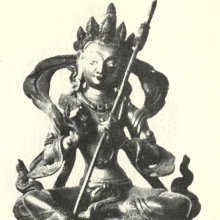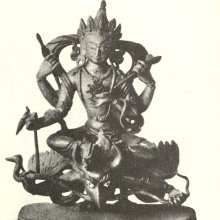Vishnudeva, Viṣṇudeva, Vishnu-deva: 5 definitions
Introduction:
Vishnudeva means something in Jainism, Prakrit, Hinduism, Sanskrit, the history of ancient India. If you want to know the exact meaning, history, etymology or English translation of this term then check out the descriptions on this page. Add your comment or reference to a book if you want to contribute to this summary article.
The Sanskrit term Viṣṇudeva can be transliterated into English as Visnudeva or Vishnudeva, using the IAST transliteration scheme (?).
Images (photo gallery)
In Jainism
General definition (in Jainism)
Source: archive.org: The Jaina IconographyViṣṇudeva (विष्णुदेव) or Viṣṇu is the father of Śreyāṃśanātha: the eleventh of twenty-four Tīrthaṃkaras or Jinas, commonly depicted in Jaina iconography.—The Jaina Purāṇas record his lineage. His father was a Kṣatriya prince of Ikṣvāku clan named Viṣṇu (Viṣṇudeva) and his mother was called Viṣṇudri. His home was at Siṃhapurī, the present Sārnāth.

Jainism is an Indian religion of Dharma whose doctrine revolves around harmlessness (ahimsa) towards every living being. The two major branches (Digambara and Svetambara) of Jainism stimulate self-control (or, shramana, ‘self-reliance’) and spiritual development through a path of peace for the soul to progess to the ultimate goal.
India history and geography
Source: Piotr Balcerowicz: Royal Patronage of JainismViṣṇudeva (विष्णुदेव) is the name of one of the sixteen Jain Ācāryas (teachers) mentioned in the inscription of Pārśvanātha Bastī (which was engraved in 522 Śaka era, i.e. Vikram 657 years and 1127 V.N.).—Accordingly, “[...] when a calamity in Ujjayinī lasting for a twelve-year period was foretold by Bhadrabāhu-svāmin, who comes from an impeccable old race which is a lineage of great men coming in succession within the lineage of teachers [viz., Viṣṇudeva], and who possesses the knowledge of the truth of the Great Omens (mahānimitta) in eight parts (canonical books, aṅga), who sees the three times (past, present and future), after he had seen it with the help of the omens, the whole congregation [of Jaina monks] set out from the northern region towards the southern region. Gradually, they [viz., Viṣṇudeva] reached a locality of several hundred villages, full of happy people, riches, gold, grain, herds of cows, buffaloes, goats and sheep. [...]”.

The history of India traces the identification of countries, villages, towns and other regions of India, as well as mythology, zoology, royal dynasties, rulers, tribes, local festivities and traditions and regional languages. Ancient India enjoyed religious freedom and encourages the path of Dharma, a concept common to Buddhism, Hinduism, and Jainism.
Languages of India and abroad
Sanskrit dictionary
Source: Cologne Digital Sanskrit Dictionaries: Aufrecht Catalogus CatalogorumViṣṇudeva (विष्णुदेव) as mentioned in Aufrecht’s Catalogus Catalogorum:—son of Lakṣmīśa, grandson of Paramārādhya: Mantradevatāprakāśikā.
Source: Cologne Digital Sanskrit Dictionaries: Monier-Williams Sanskrit-English DictionaryViṣṇudeva (विष्णुदेव):—[=viṣṇu-deva] [from viṣṇu] m. Name of an author, [ib.]
[Sanskrit to German]
Sanskrit, also spelled संस्कृतम् (saṃskṛtam), is an ancient language of India commonly seen as the grandmother of the Indo-European language family (even English!). Closely allied with Prakrit and Pali, Sanskrit is more exhaustive in both grammar and terms and has the most extensive collection of literature in the world, greatly surpassing its sister-languages Greek and Latin.
See also (Relevant definitions)
Partial matches: Vishnu, Deva, Teva.
Starts with: Vishnudevaradhya, Vishnudevatya.
Full-text: Paramaradhya, Vishnu, Vishnudevaradhya, Lakshmisha suri, Vishnudri, Simhapuri, Mantradevaprakashika, Mantradevataprakashika, Shreyamsanatha.
Relevant text
Search found 8 books and stories containing Vishnudeva, Viṣṇudeva, Vishnu-deva, Viṣṇu-deva, Visnudeva, Visnu-deva; (plurals include: Vishnudevas, Viṣṇudevas, devas, Visnudevas). You can also click to the full overview containing English textual excerpts. Below are direct links for the most relevant articles:
Garga Samhita (English) (by Danavir Goswami)
Verse 5.10.19 < [Chapter 10 - The Stories of the Washerman, Weaver, and Florist]
Verse 1.15.6 < [Chapter 15 - Revelation of the Universal Form to Nanda’s Wife]
Puranic encyclopaedia (by Vettam Mani)
Prasthanatrayi Swaminarayan Bhashyam (Study) (by Sadhu Gyanananddas)
2.6. Vedanta Darśana < [Chapter 1 - Introduction]
The Skanda Purana (by G. V. Tagare)
Chapter 22 - Jalandhara Attains Salvation < [Section 4 - Kārttikamāsa-māhātmya]
Chapter 7 - Worship of the Liṅga < [Section 1 - Kedāra-khaṇḍa]
Chapter 27 - The Glory of Aṅkapāda (Restoration of Sāndīpani’s Son) < [Section 1 - Avantīkṣetra-māhātmya]
The Linga Purana (by J. L. Shastri)
Chapter 8 - The eight-syllabled Mantra < [Section 2 - Pūrvabhāga]
A study of the philosophy of Jainism (by Deepa Baruah)
Chapter I.c - The lives of the Tīrthaṅkaras < [Chapter I - Introduction]

